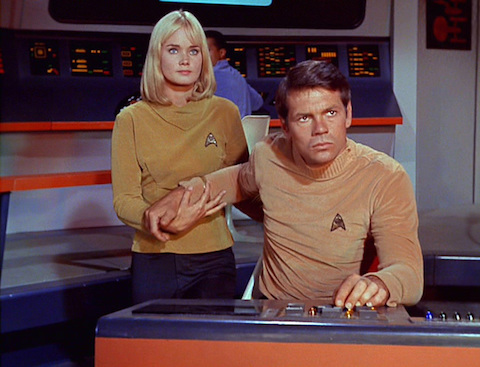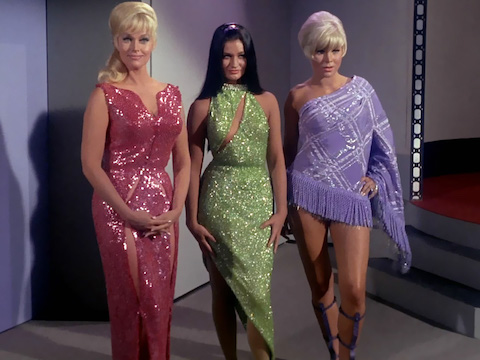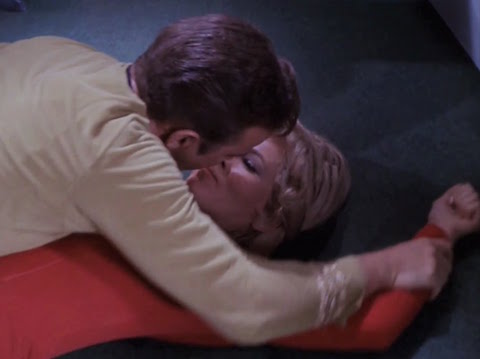Gene Roddenberry was a sexist pig (and other observations about Star Trek and sex)
I’ve been watching Star Trek (The Original Series) again. Six episodes in, and with the perspective of what we’ve learned in the last five decades, I find its portrayal of women shameful. It says a lot about the way we still think about gender relations and how we got here.
Understand where I’m coming from. I was a child too young to watch the original series when it aired in 1966 to 1969, but became a huge fan in reruns.
By the time I entered college in 1979, it was an article of faith that Star Trek was the preeminent show about the future, a program that challenged our ideas about humanity by viewing them from the viewpoint of a technologically advanced future. In short, it was the epitome of science fiction, and I worshipped at the altar of science fiction. Star Trek’s treatment of race, science, the concept of the alien, and the human soul was like nothing else on television — it led the culture forward. And it was great fun, with great characters and scripts by the world’s best science fiction writers, like Richard Matheson, Norman Spinrad, Theodore Sturgeon, and Harlan Ellison.
I watched those repeats endlessly. As the treasurer of the United Federation of Star Trek Fans at Penn State, I joined my fellow fans in doing whatever we could to bring the show back on the air. I was a true believer in what Star Trek was trying to do and what it represented.
Fifty years since it first aired, and almost forty years since those college days, I took advantage of my subscription to CBS All Access, a subscription I bought only to watch the newest Star Trek series, and decided to watch the original series in the order the episodes were aired.
What were they thinking?
Slowly, unevenly, and not without conflict, our attitudes about the sexes have changed a bit since 1966. So, how did 1966 Star Trek look at women?
This review is based on the first six episodes: “The Man Trap,” “Charlie X,” “Where No Man Has Gone Before,” “The Naked Time,” “The Enemy Within,” and “Mudd’s Women.”
In “The Man Trap,” the crew beam down to perform exams on an archaeologist Robert Crater and his wife Nancy, eventually to find that she has been replaced by a beast that reads minds, can appear as any other person, and preys on and kills people. Within the first two minutes, one of the crew is already being a pig. (I’m grateful to Chakoteya.net for providing all the scripts):
DARNELL: (seeing a young blonde) How do you do, ma’am?
KIRK: Something wrong, Darnell?
DARNELL: Excuse me sir but, ma’am, if I didn’t know better I would swear you were someone I left behind on Wrigley’s Pleasure Planet. It’s funny, you’re exactly like a girl that . . .
MCCOY: A little less mouth, Darnell.
Meanwhile, the only female officer on the bridge is already behaving like a schoolgirl:
SPOCK: Miss Uhura, your last sub-space log contained an error in the frequencies column.
UHURA: Mister Spock, sometimes I think if I hear that word frequency once more, I’ll cry.
SPOCK: Cry?
UHURA: I was just trying to start a conversation.
SPOCK: Well, since it is illogical for a communications officer to resent the word frequency, I have no answer.
UHURA: No, you have an answer. I’m an illogical woman who’s beginning to feel too much a part of that communications console. Why don’t you tell me I’m an attractive young lady, or ask me if I’ve ever been in love? Tell me how your planet Vulcan looks on a lazy evening when the moon is full.
This is pretty mild compared to what’s coming in the next five episodes.
 In “Where No Man Has Gone Before,” the Enterprise heads into an unknown energy barrier at the edge of the galaxy. On the bridge are the officers and several younger, female characters with the rank of yeoman, sort of a secretarial role. Naturally, as the music mounts, the strong male character reaches back reassure the yeoman, holding her hand as they head into the storm.
In “Where No Man Has Gone Before,” the Enterprise heads into an unknown energy barrier at the edge of the galaxy. On the bridge are the officers and several younger, female characters with the rank of yeoman, sort of a secretarial role. Naturally, as the music mounts, the strong male character reaches back reassure the yeoman, holding her hand as they head into the storm.
In “The Naked Time,” a disease gets the crew to reveal their innermost feelings. Sulu is a swordsman. Spock is a sentimental philosopher. Kirk is in love with his ship. And Nurse Chapel, of course:
SPOCK: What is it, Nurse?
CHAPEL: Mister Spock, (takes his hand) the men from Vulcan treat their women strangely. At least, people say that, but you’re part human too. I know you don’t, you couldn’t, hurt me, would you? I’m in love with you, Mister Spock. You, the human Mister Spock, the Vulcan Mister Spock.
SPOCK: Nurse, you should . . .
CHAPEL: Christine, please. I see things, how honest you are. I know how you feel. You hide it, but you do have feeling. Oh, how we must hurt you, torture you.
SPOCK: I’m in control of my emotions.
CHAPEL: The others believe that. I don’t. I love you. I don’t know why, but I love you. I do love you just as you are. Oh, I love you.
SPOCK: I’m sorry.
UHURA [OC]: Captain is en route to Engineering, Mister Spock. Can you take the bridge? Acknowledge.
SPOCK: I am sorry.
CHAPEL: Christine.
SPOCK: Christine.
 In “Mudd’s Women,” the entire male crew is transfixed by beautiful women brought aboard by a con-man. Half the episode consists of the men in the crew leering, forgetting to to do their jobs, and commenting on the women’s looks:
In “Mudd’s Women,” the entire male crew is transfixed by beautiful women brought aboard by a con-man. Half the episode consists of the men in the crew leering, forgetting to to do their jobs, and commenting on the women’s looks:
But the worst is in “The Enemy Within.” The outlandish premise of this otherwise entertaining and dramatic episode is that a transporter malfunction has split Captain Kirk into two parts, a genial but indecisive Kirk and an evil and paranoid one. Naturally, the evil Kirk gets drunk and goes to the quarters of his beautiful yeoman, Janice Rand (Grace Lee Whitney), where he assaults her.
RAND: Oh! Captain, you startled me. Is there something that you . . .? Can I help you, Captain?
KIRK: Jim will do here, Janice.
RAND: Oh.
KIRK: You’re too beautiful to ignore. Too much woman. We’ve both been pretending too long. (grabs her) Stop pretending. Let’s stop pretending. Come here, Janice. Don’t fight me. Don’t fight me, Janice. (kisses her)
RAND: Captain!
KIRK: Just a minute, Janice. Just a minute! (forces her onto the floor, she scratches his face and gets away to the door which opens just as Fisher is passing by)
RAND: Call Mister Spock! Call Mister Spock!
 Eventually, of course, Kirk two parts get reunited and back to normal. But back on the bridge, Spock leers at Yeoman Rand and says “The, er, impostor had some interesting qualities, wouldn’t you say, Yeoman?” The clear implication is that, after being assaulted, she really ought to appreciate the manliness of Captain Kirk, who just tried to rape her.
Eventually, of course, Kirk two parts get reunited and back to normal. But back on the bridge, Spock leers at Yeoman Rand and says “The, er, impostor had some interesting qualities, wouldn’t you say, Yeoman?” The clear implication is that, after being assaulted, she really ought to appreciate the manliness of Captain Kirk, who just tried to rape her.
Gene Roddenberry and the male gaze
Star Trek creator Gene Roddenberry wanted his new show to succeed. His philosophy reflected and expanded his fairly typical attitudes about sex. He and his writers created female characters in professional roles like bridge officer, psychiatrist, and historian. But in case after case, these women reveal that their only actual role is to be objects of desire for the males in the crew. The idea of a professional woman being satisfied just being a professional is absent. All the women wear short skirts, and leering and even assault are constant.
Yes, this is a product of the times in which this was created. But Roddenberry’s Star Trek challenged our ideas about race, freedom, leadership, and war. In the original series, he failed to do the same with gender. Women in Star Trek are maidens in distress.
Things matured in the rest of the series, but it remained dedicated to the “male gaze,” presenting women on screen for the enjoyment of men.
The subsequent Star Trek series were better. But Roddenberry’s original series remains a testament to the sexist attitudes of the 60s.
How does this bear on all the harassment accusations we new see?
I’m not blaming Star Trek for all the harassers out in the world now. They are responsible for their own actions.
But consider how media, like Star Trek, normalized their attitudes. If you grew up in the 60s, the boss chasing his secretary around the desk was a trope. Every woman in the workplace had to deal with attitudes just like what I’ve described here. And every man who even considered such actions viewed media like this and said, “See, that’s the way the world is.” If there was a moment to consider a woman from a more human perspective, and not as prey for the male predator, this media helped ensure that the moment would pass without additional reflection.
My own journey to awareness has happened over years of interacting with professional, intelligent women in the workplace and socially. I had plenty of sexist attitudes, and it’s interesting to me to view these episodes from the perspective of many decades and realize how far my attitudes have come — how what once seemed totally normal to me now seems completely wrong.
No one who harasses a woman can use this as an excuse. But I’d like to see today’s film and television artists create some art that undoes the sexist attitudes of the past — the pernicious attitudes that their peers have so effectively supported and contributed to.
Star Trek was definitely in my friends’ Geek Wheelhouse, but never made sense to me. This is why.
As a Trekkie, I do appreciate the idealism of the universe created by Gene Roddenberry. The sexism in the original series is palatable. As much as women were still objectified in everything from their roles to their uniforms and costumes, they were still significantly ahead of the contemporary women. Having a woman, much less a black woman, as communications officer was unthinkable in the late 50s and even mid-60s, yet they broke that barrier. While you raise good points about the show’s presentation of women, you overlook or bypass the behind the scenes issues with Roddenberry. He was a philanderer of the highest order. He was having affairs with both Nichelle Nicols and Majel Barrett while married to his first wife, Eileen-Anita Rexroat. So, we can see that sexual harrassment and inappropriate behavior was happening in the 20th and 23rd centuries — in front and behind the cameras.
I was aware of Roddenberry’s behavior. But I chose to focus on the impact of his art rather than his personal behavior.
Being a philanderer does not make one a sexual harasser. People need to stop policing adultery. That has absolutely nothing to do with actual harassment.
Roddenberry was the employer of these women and bragged about abusing his power. Stop defending an obvious pig.
Exactly. It is an inherently unequal relationship when it involves an employer and an employee, and that is why such relationships are considered inherently improper.
Please Spock, don’t say it’s fascinating.
No. But it is interesting.
JC in a baggy! Dig up all the dead, tear their bones apart and of course forget what they gave us! After all we are in the 21st Century and we are all knowing and righteous!
I think this is remembering what he gave women, actually. I’ve been quite disappointed in my own rewatch.
His original pitch had a female captain. He also wanted strong female roles but the network rejected it because they thought it wouldn’t be believable. This was a time when women were still thought of as being inferior.
You’re letting the rest of the history of Star Trek go free? Come on…
Sure, the science or plots were more intriguing as science and technology advanced decade after decade, but the franchise is still stark misogynistic; most don’t even realize that or care to recognize it, I am afraid…
…. so tell me one time when any actress + character in the franchise, at one time or another, did not to submit to, willingly or unwillingly, to the ogling and voyeurism of its fans either on the scree of Trek, or elsewhere, either to get noticed or to make cash with their fame?
It’s the same old b.s. just more advanced every on turn.
Sex sells but selling one’s self short will make one to come up short in the end, and, yes, all good things, our lives included must come to and end and logic dictates that we have to be personally accountable to the morality that we are using to lead us to these final ends … this brings us back to the topic about Gene.
“All the women wear short skirts”
You have to be careful about how to interpret this. Originally, Yeoman Rand, portrayed by Grace Lee Whitney, was supposed to dress in the same manner that the women had in the two pilots, with a loose gold-colored tunic and black trousers. But Whitney complained to Roddenberry that this wouldn’t allow her to show off her “dancer’s legs,” so a short skirt was designed for her and became the norm for female crew members. Therefore, you could justly say that it was more “female vanity” than “sexism” that led to all the crew women wearing short skirts. You also have to recall that in the ’60s miniskirts were very “in” and were considered to symbolize female liberation. Later, attitudes tended to change and to associate such short skirts more with “sexism” and “exploitation” and “the male gaze.” So, again, you have to be careful about interpreting aspects of the show like this, in light of what actually happened and what the cultural attitudes of the time were.
I want to propose a different perspective. I think Star Trek parodies sexism. Some of the scenes, like the one you mentioned with Uhura about being an illogical woman, seem all to aware of their sexist implications. It’s hard to tell, but sometimes I get the sense that it’s constantly sort of making satire of the times, doing it so subtly that everyone watching back then just thought it was natural sexism because they didn’t think twice about it.
Geeeeze… Can’t even look up favorite shows from childhood without these “woke – Nazi’s” trying to ruin yet another great artist and innovators name. These knuckleheads are also doing it up here in Davis California, right now, trying to remove/destroy a beautiful bronze sculpture of Mohandas Mahatma Gandhi.
As a male Bernie Supporter, I gotta tell you, this type of hypocritical, backwards looking baloney is why Trump, (the orange idiot), won the first time, and exactly why he’s going to win this November. People are done with the so-called “woke” Nazi’s who are judging everyone for this and that, playing the perpetual victim, and doing it from their safe spaces online, or on a university campus like mine.
Roddenberry was awesome, an genius, and did more in his life for women’s lib and human rights than every dummy put together on this website. Your article isn’t even put together well, and does not define a cogent argument, just whining.
Well… I’m gonna go watch a rerun of the old Star Trek and check out Uhura. Nice job to the casting agents of the original Star Trek, Uhura was a HOTTIE!!!
🙂
Before or after he became a heavy alcoholic?
TNG was worse, though it depends on what you consider bad and or worse. The original script portrayed most of the bridge crew as queer, with betazoid’s having four breasts makes one wonder how we ended up with Wesley Crusher or Riker’s Beard.
Funny fact: The original Trek used the ‘N’ word aimed at Ahura in that episode with Abe Licoln.
Its fun to look at history through current lenses. Maybe they weren’t what you think of them today?
Oh look a debate troll!
“A lens is a fixed piece of equipment meaning you can only see one angle of an image at a time assuming its not distorted you might just have bad eyesight.”